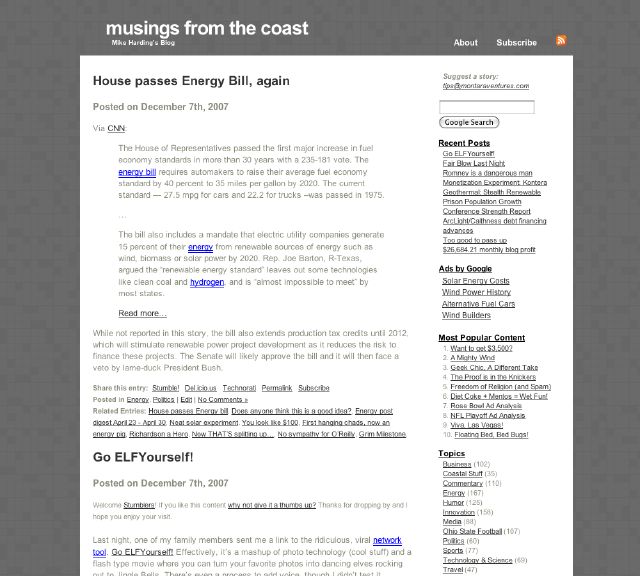Apparently, the message on this sign is not true.

It is not my intent to post frequently about religion, but
I keep seeing things that prompt me to comment. Thus, another entry on religion.
I’ve commented earlier that no religion is any more or less valid than any other religion and recently I read an article that demonstrates this point very clearly. The Episcopal Church has been struggling for some period of time on how the humans who lead the church interpret scripture. Particularly around the issues of ordination of women and the role of gays in the church.
The Fresno Diocese (even though it is in California technically, it may as well be in Oklahoma from a world view perspective) has voted to leave the US led church and join a conservative South American expression of the church. This is one of 55 entities that has made such decisions to date.
Setting aside the reasons for the schism, if, in fact, the religion was the “one true faith” founded on words from a super-being, there wouldn’t be this petty squabbling over what the deity meant (when not saying anything about the role of women or gays in the church in the scripture.) Once one starts to view religion the way one views Santa, his elves, flying reindeer, and a sack of presents for the good kids, reading about such disagreements, not between religions, but within a single religion, becomes almost comical. Why almost comical?
Because real people are hurt by believing these folk stories every day.
One other aside, when mentioning the 77 churches and various pieces of property in this article, it only served to remind me that religion is a BUSINESS. Like all businesses, this one should be paying taxes. It’s time to end the tax exemption for religions/churches in this country.
Germany has recently contemplated banning Scientology from the country stating that “the goals of Church of Scientology to be in conflict with the principles of the nation’s constitution.”
That’s pretty strong stuff. Those of you who read this site with regularity know that I’m not all that enthusiastic with religion and its affect on the population at large, but I draw a very bright line where someone’s individual choice about religion could be impaired by a state. Having been in and around Germany and Germans frequently over the past 20 years, I can say this sort of activity surprises me. If it were a little more targeted, aimed at keeping religious dogma from invading the government, that would be much more sensible. Church and State shouldn’t mix.
But that goes both ways, I don’t believe the State should ever be involved in someone’s personal choice about faith and/or religion. There are some simple facts about this subject:
- There are many different religions in the world
- Many claim to be the “one true faith”
- No one can prove that any given religion is more or less valid than any other
Taking steps down the path where the State determines which religions/faiths/gods are valid oversteps the State’s power and responsibility. These are choices best left to the people to express. When State’s seek to intervene, they tend to look like the People’s Republic of China and its repression of Falun Gong (a movement many Westerners wouldn’t even classify as a religion.)
So Germany, take a deep breath, think about this one. The world is watching what you do…
This entry was catalyzed by this news story at CNN.
Last night, Ohio State’s Junior Linebacker James Laurinaitis won the prestigious Butkus Award, bestowed upon the best linebacker in the land each year. He’s the heart and soul of the number one defense on the number one team in the country, so in a way it’s fitting he would win this award.
Bucknuts has a nice article posted with details, facts, and figures. This entry is intended as a hearty congratulations to James, and to his cohorts on D. It’s been an outstanding year and this group has really produced.
Ta Da! I’ve just unveiled our new look, I hope you like it. Please do let me know what you think, leave a comment if you’d like. With the change, I was trying to make the site a little more readable, improve the navigation, and generally make the look a little more clean while creating some new opportunities for monetization.
There are a number of “new” things to look at. On the left hand navigation bar, you’ll notice we finally integrated search for web or this site. Directly beneath the search box is a new section, Featured Links. To the right of that are a few “button” images. These two sections are set aside for sponsors of this site. If you have need of or are interested in what they offer, check them out.
The Categories section has gone on a diet, I’ve consolidated down to the group you see to the left. If you hold your mouse over a category, it will give a short description of the contents. The Links section survives intact from our prior version, good resources and reading there, I encourage to explore them.
The Tools section is new, in addition to an About page (which existed in the old look), an Advertise Here page has been added to provide information about advertising, Archives, which organizes content by posting month/year and category now exists, and I’ve added an extensive section on the tools and technologies used to create this site and keep it up-to-date.
Below the Tools sections are Most Popular posts and Recent Posts and Comments sections. That’s a short tour, I hope that you’ll find our new look and feel not only easy on the eyes, but easier to navigate and read content. Thanks for dropping by!
As a point of comparison, the image below is a screen shot of our “old” look:
Musings from the Coast “Old Look”

Via CNN:
The House of Representatives passed the first major increase in fuel economy standards in more than 30 years with a 235-181 vote. The energy bill requires automakers to raise their average fuel economy standard by 40 percent to 35 miles per gallon by 2020. The current standard — 27.5 mpg for cars and 22.2 for trucks –was passed in 1975.
…
The bill also includes a mandate that electric utility companies generate 15 percent of their energy from renewable sources of energy such as wind, biomass or solar power by 2020. Rep. Joe Barton, R-Texas, argued the “renewable energy standard” leaves out some technologies like clean coal and hydrogen, and is “almost impossible to meet” by most states.
Read more…
While not reported in this story, the bill also extends production tax credits until 2012, which will stimulate renewable power project development as it reduces the risk to finance these projects. The Senate will likely approve the bill and it will then face a veto by lame-duck President Bush.






